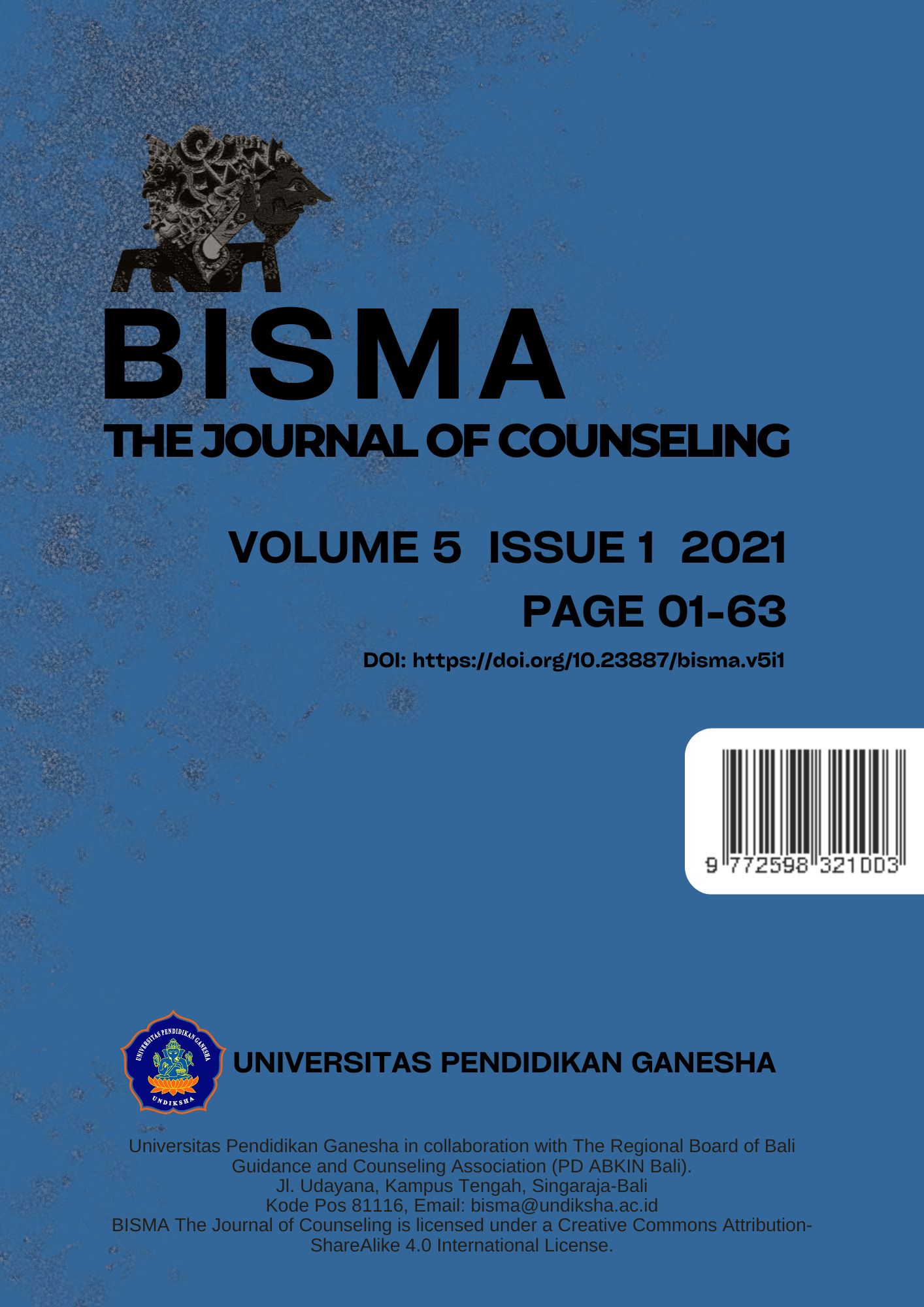Mental Readiness and Challenges faced by Health care Front liners during COVID-19 Pandemic in Malaysia
DOI:
https://doi.org/10.23887/bisma.v5i1.34666Keywords:
COVID-19, healthcare frontliners, mental, MalaysiaAbstract
The readiness and mental challenges of health care front-liners are one of the big issues that need to be addressed by the Ministry of Health Malaysia (MOH) and also the Malaysian Board of Counselors (MBC). This is to ensure that all threats to health care front-liners can be overcome in order to streamline the duties of fighting the COVID-19 pandemic in Malaysia. Therefore, this study aims to understand the readiness and mental challenges of health front workers (Font liners) in facing the COVID-19 pandemic. This study uses a qualitative design with a case study approach. The study participants consisted of two medical officers and two nurses from the states of Johor and Sabah who had more than six months of experience in handling COVID-19 cases. Study data were obtained through semi-structured interview techniques. The findings state that there are two sub-theme codes from the mental readiness of health care front liners and four subtrahend codes from the mental challenges of health care front liners in facing the COVID-19 pandemic. Information from this study can be used by the MOH and MBC in dealing with the possible mental health issues of the health care front liner, post-COVID-19 in Malaysia.References
Altahir, A., Mathur, N., Thiruchelvam, L., Mustafa Abro, G., Radzi, S., Dass, S., Gill, B. S., Zulkifli, S., & Asirvadam, V. (2020). Modeling the Impact of Lock-down on COVID-19 Spread in Malaysia.May.https://doi.org/10.1101/2020.07.17.208371.
Asri, N. S., Wen, K. C., & Zolkepli, I. A. (2020). Pembinaan Kepercayaan dan Persepsi Risiko dalam Pembuatan Keputusan: Kajian Kes Komuniti ‘Couchsurfing’ (Trust Building and Perceived Risk in Decision-Making Process: The Case Study of Couchsurfing Community). Jurnal Komunikasi: Malaysian Journal of Communication, 36(2), 235–252. https://doi.org/10.17576/jkmjc-2020-3602-14
Azizan, M., Daud, M., & Awang, A. H. (2020).Insan bagi pekerja Barisan Hadapan COVID-19.July.
Eikhwan Ali,& Mahirah A Rashid. (2020). Pandemik covid 19 mendepani impak psikososial.Tsis, 11, 1–14.
Faiz.I & Haidar. (2020). Dalam pengurusan Pandemik COVID-19,Universiti Kebangsaan Malaysia
Holmes, E.A., O’Connor, R.C., Perry, V.H., Tracey, I., Wessely, S., Arseneault, L., Ballard, C., Christensen, H., Cohen Silver, R., Everall, I., Ford, T., John, A., Kabir, T., King, K., Madan, I., Michie, S., Przybylski, A.K., Shafran, R., Sweeney, A., Worthman, C.M., Yardley, L., Cowan, K., Cope, C., Hotopf, M., Bullmore, E. 2020. Multidisciplinary research priorities for the COVID-19 pandemic: a call for action for mental health science. Lancet Psychiatry 7(6): 547-60.
Iranian, A. (2020). Letter to the Editor COVID-19 and mental health : An Iranian perspective. 54(May), 2019–2020. https://doi.org/10.1016/j.ajp.2020.102266
Ishak, N. M., Yassin, S. F. M., Hamzah, M. I. M., & Ariffin, S. R. (2013). Kajian Kes. Penyelidikan Dalam Pendidikan, 355.
John W.Creswell & John David Cresswell (2017).Research Design : Qualitative, Quantitative, and Mixed Methods Approaches 5th edition,ISBN-13: 978-1506386706
Labrague, L. J., & De los Santos, J. A. A. (2020). COVID-19 anxiety among front-line nurses: Predictive role of organisational support, personal resilience and social support. Journal of Nursing Management, 28(7), 1653–1661. https://doi.org/10.1111/jonm.13121
Meyer, S., & Morand, M.-B. (2015). Mental health and psychosocial support in humanitarian settings. Intervention, 13(3), 235–247. https://doi.org/10.1097/WTF.0000000000000089
Mohd Saiboon, I. (2020). The Preparation, Delivery and Outcome of COVID-19 Pandemic Training Program among the Emergency health care front linersners (EHFs): The Malaysian Teaching Hospital Experience. Medicine & Health, 15(1), 250–265. https://doi.org/10.17576/mh.2020.1501.23
Nyashanu, M., Pfende, F., & Ekpenyong, M. (2020). Exploring the challenges faced by frontliner workers in health and social care amid the COVID-19 pandemic: experiences of frontline workers in the English Midlands region, UK. Journal of Interprofessional Care, 34(5), 1–7. https://doi.org/10.1080/13561820.2020.1792425
See, K. C., Liew, S. M., Ng, D. C. E., Chew, E. L., Khoo, E. M., Sam, C. H., Sheena, D., Zahilah Filzah, Z., Chin, S. Y., Lee, P. Y., Tan, L. P., Farah Najwa, Z., Sabrina, S., Them, W. W., Saipriya, T., Muhammad Zamakhshari, Z. A., Cheah, W. K., Peariasamy, K., Goh, P. P., & Ibrahim, H. (2020). COVID-19: Four Paediatric Cases in Malaysia. International Journal of Infectious Diseases, 94, 125–127. https://doi.org/10.1016/j.ijid.2020.03.04
Sidi, H. (2020). The Psychological Sequelae during Mental Health and COVID-19 Pandemic: Learning from the Past for Today’s Coping Styles. Medicine & Health, 15(1),1–4. https://doi.org/10.17576/mh.2020.1501.01
Singh, R., & Adhikari, R. (2020).Age-structured impact of social distancing on the COVID-19 epidemic in India.arXiv preprint arXiv:2003.12055.
Umaira, A., Safri, A., & Thevadas, R. (2020). International Journal of Infectious Diseases COVID-19 outbreak in Malaysia:Actions taken by the Malaysian government. 97, 108–116. https://doi.org/10.1016/j.ijid.2020.05.093









